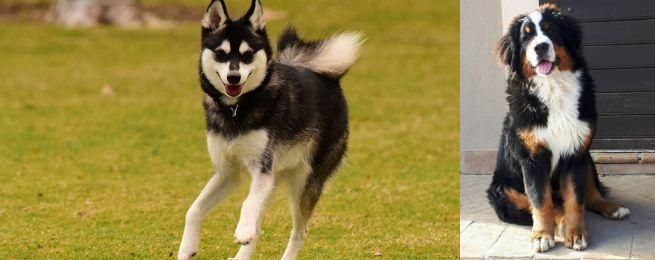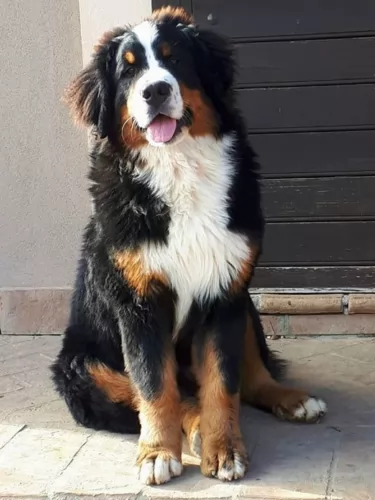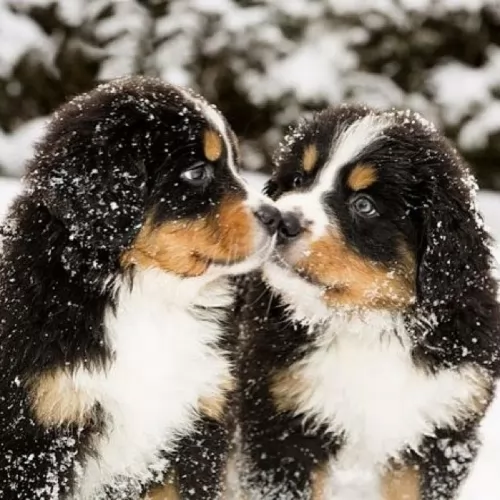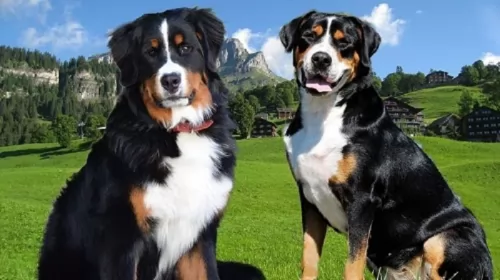 Petzlover
Petzlover Alaskan Klee Kai is originated from United States but Mountain Burmese is originated from Myanmar. Alaskan Klee Kai may grow 27 cm / 10 inches shorter than Mountain Burmese. Alaskan Klee Kai may weigh 54 kg / 119 pounds lesser than Mountain Burmese. Alaskan Klee Kai may live 8 years more than Mountain Burmese. Both Alaskan Klee Kai and Mountain Burmese has same litter size. Both Alaskan Klee Kai and Mountain Burmese requires Low Maintenance.
Alaskan Klee Kai is originated from United States but Mountain Burmese is originated from Myanmar. Alaskan Klee Kai may grow 27 cm / 10 inches shorter than Mountain Burmese. Alaskan Klee Kai may weigh 54 kg / 119 pounds lesser than Mountain Burmese. Alaskan Klee Kai may live 8 years more than Mountain Burmese. Both Alaskan Klee Kai and Mountain Burmese has same litter size. Both Alaskan Klee Kai and Mountain Burmese requires Low Maintenance.
 Alaskan Klee Kai breed is created in Alaska by Linda S Spurlin with help of her family. When she saw a smaller type of Siberian Husky, she immediately wanted to create a smaller type of Husky that will be a great companion dog. She did not create this breed with dogs that suffer from dwarfism as if it’s the case with most other breeders. She breeds Alaskan Husky with smaller dog breeds that looked a like a husky. Breeds like Alaskan Eskimo Dog or Schipperke. They are still not recognized by some Kennel clubs, but their popularity is constantly on the rise.
Alaskan Klee Kai breed is created in Alaska by Linda S Spurlin with help of her family. When she saw a smaller type of Siberian Husky, she immediately wanted to create a smaller type of Husky that will be a great companion dog. She did not create this breed with dogs that suffer from dwarfism as if it’s the case with most other breeders. She breeds Alaskan Husky with smaller dog breeds that looked a like a husky. Breeds like Alaskan Eskimo Dog or Schipperke. They are still not recognized by some Kennel clubs, but their popularity is constantly on the rise.
 The Burmese Mountain Dog is quite often taken to be the Bernese Mountain Dog, a Swiss farm dog. However, the Burmese Mountain Dog comes not from Switzerland but from Myanmar and Burma. The Burmese was bred to hunt skunks and guard livestock for the northern tribesman of Myanmar. The way they hunted for the aggravating skunks was to hide themselves in the underbrush and wait for the skunk to go by. Their facial markings confuse skunks when they see him in the bush with a black and white face. At the same time, his rust color lets the hunter know he is the dog not the skunk.
The Burmese Mountain Dog is quite often taken to be the Bernese Mountain Dog, a Swiss farm dog. However, the Burmese Mountain Dog comes not from Switzerland but from Myanmar and Burma. The Burmese was bred to hunt skunks and guard livestock for the northern tribesman of Myanmar. The way they hunted for the aggravating skunks was to hide themselves in the underbrush and wait for the skunk to go by. Their facial markings confuse skunks when they see him in the bush with a black and white face. At the same time, his rust color lets the hunter know he is the dog not the skunk.
The Mountain Burmese is an incredible athlete despite the size. They are agile. They are quick. They can climb trees – as many as fifty feet while chasing a skunk. They also make a great companion and love to be a family dog. They are calm and gentle as an adult and great with kids. They are easily trained but remember they can climb trees. However, they do not do well with cats that are black and white or solid black because they confuse them with the skunk prey.
 Weight of the Alaskan Klee Klei variates from dog to dog, but average male size is between 33-44cm. While females size is 28-40cm. The weight of the average male, an adult dog is 13 to 15kg. As you may see Klee Klei can be very small dogs, and that depends on every dog.
Weight of the Alaskan Klee Klei variates from dog to dog, but average male size is between 33-44cm. While females size is 28-40cm. The weight of the average male, an adult dog is 13 to 15kg. As you may see Klee Klei can be very small dogs, and that depends on every dog.
A lifespan of Klee Klei is 12-16 years.
Litter Size of the breed again depends on every dog but normal size for this breed is between 4-8 puppies.
Other Name for Alaskan Klee Klei is just a Klee Klei.
 The Mountain Burmese Dog is a large, sturdy, well built and athletic canine. Strong and well balanced, he is agile and athletic when it comes to the work, he has to do in chasing skunks. He has a full body with a large head and dark, oval eyes. The Burmese has triangular ears close to his head and medium in size. With a flat, broad skull the muzzle is straight and strong. They have black noses and a scissors bite, on their muscular, strong neck. With a deep chest and broad back, they have strong ribs. Finally, the tail is bushy, long and hangs low.
The Mountain Burmese Dog is a large, sturdy, well built and athletic canine. Strong and well balanced, he is agile and athletic when it comes to the work, he has to do in chasing skunks. He has a full body with a large head and dark, oval eyes. The Burmese has triangular ears close to his head and medium in size. With a flat, broad skull the muzzle is straight and strong. They have black noses and a scissors bite, on their muscular, strong neck. With a deep chest and broad back, they have strong ribs. Finally, the tail is bushy, long and hangs low.
 Klee Klei is very intelligent breed with a lot of energy. They love spending time with the family, especially in the outdoor activities. Klee Klei is very friendly towards children and new people, but they will also be excellent watchdogs too. Due to their intelligence, they are very easy to train. You should practice a positive way of awarding for them. They love pleasing and they love food, so it is a match made in heaven for training the Klee Klei. They will enjoy playing with other animals because they love to run and spend time with them, but you must socialize them from the early age. It is very important to socialize them with other animals and you will not have anything to worry about. They have a high prey drive so you will have to keep them on the leash while walking because if they notice something they will run towards it immediately. So for your, and your pet's safety, it is the best to keep the leash on. They do not bark a lot, but they will express when they are not pleasured because they can be very sensitive
Klee Klei is very intelligent breed with a lot of energy. They love spending time with the family, especially in the outdoor activities. Klee Klei is very friendly towards children and new people, but they will also be excellent watchdogs too. Due to their intelligence, they are very easy to train. You should practice a positive way of awarding for them. They love pleasing and they love food, so it is a match made in heaven for training the Klee Klei. They will enjoy playing with other animals because they love to run and spend time with them, but you must socialize them from the early age. It is very important to socialize them with other animals and you will not have anything to worry about. They have a high prey drive so you will have to keep them on the leash while walking because if they notice something they will run towards it immediately. So for your, and your pet's safety, it is the best to keep the leash on. They do not bark a lot, but they will express when they are not pleasured because they can be very sensitive
 As most of the small breed dogs that are mixed with various breeds, this is one of the healthiest breeds. They do not have a lot of health issues, and usually, they tend to live a lot. Of course, you must be careful where are you buying your dog, and it is very important to choose the right owners that are taking care of the dogs and puppies. Some of the issues that this breed might have are luxation patella, thyroid disease, heart conditions, liver shunts, factor VII deficiency, and cataracts.
As most of the small breed dogs that are mixed with various breeds, this is one of the healthiest breeds. They do not have a lot of health issues, and usually, they tend to live a lot. Of course, you must be careful where are you buying your dog, and it is very important to choose the right owners that are taking care of the dogs and puppies. Some of the issues that this breed might have are luxation patella, thyroid disease, heart conditions, liver shunts, factor VII deficiency, and cataracts.
 The kind of health issues that most large or giant dogs have to deal with are some of the same things that this breed dealt with.
The kind of health issues that most large or giant dogs have to deal with are some of the same things that this breed dealt with.
 Since they are highly energetic dogs they will need a lot of fuel for playing and spending time outside. Feeding of your dog depends on daily activity, but overall you should consult with dog nutritionist for a better understanding of your dog needs.
Since they are highly energetic dogs they will need a lot of fuel for playing and spending time outside. Feeding of your dog depends on daily activity, but overall you should consult with dog nutritionist for a better understanding of your dog needs.
Puppies need more food divided into 3-5 meals per day. They would eat everything you have for them. 3-5 high-quality dry food would be enough with additional vitamins and minerals.
Normally, Klee Klei groom themselves, so you won’t have to do it too often. Again, you will have to take care of your dog with occasional baths and brushing. You will know when is the time to take care of your lovely Klee Klei, but they will do most of the work.
 Feed a high quality dog food designed for large or giant puppies. Feed 3times a day 2.5 times for puppies and go easy on the treats
Feed a high quality dog food designed for large or giant puppies. Feed 3times a day 2.5 times for puppies and go easy on the treats
There is a definite tendency for these dogs to become obese. Don’t overfeed. Don’t free feed. Large breed high quality dog food should be fed 2 times a day and go easy on the treats. Watch his weight.
strength, stamina
The breed is definitely athletic and active. They love to chase and take long walks daily. They need a large yard but be careful as they can climb trees and your fence. They are great companions when backpacking and camping. If there are skunks in the area however watch out! These are hunting dogs despite their size and they would do very well in barn hunt and field trials.